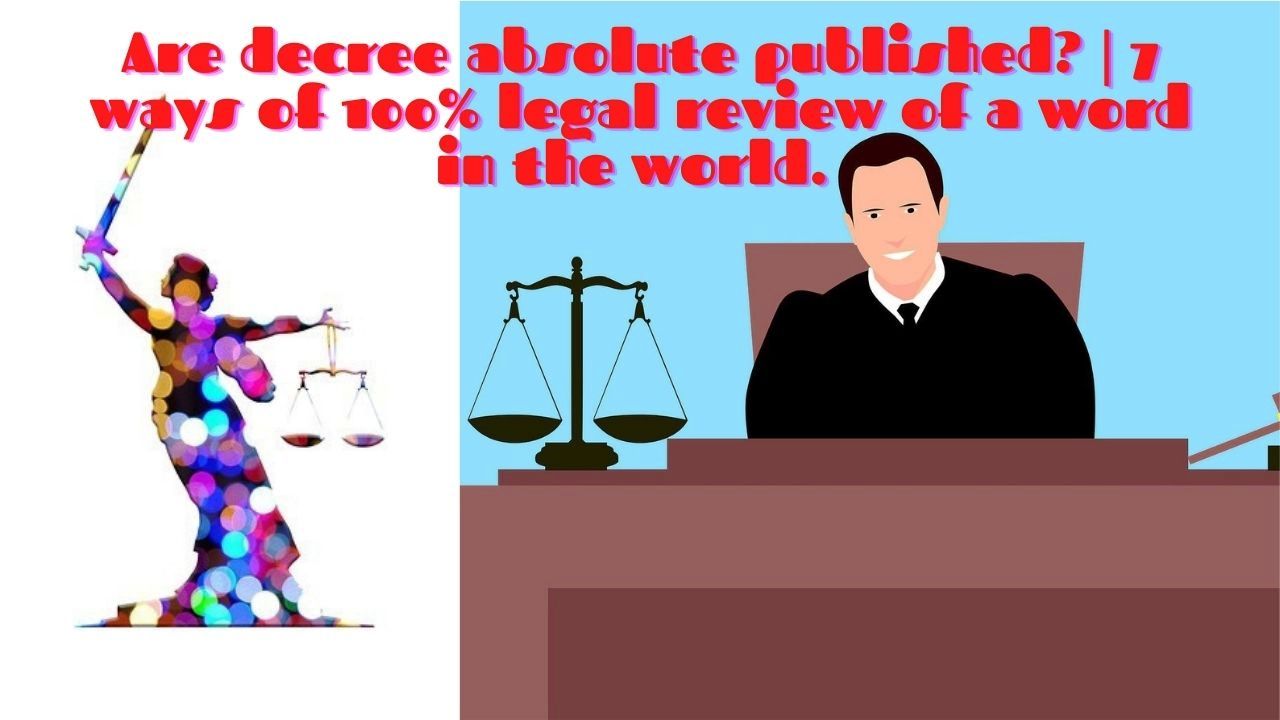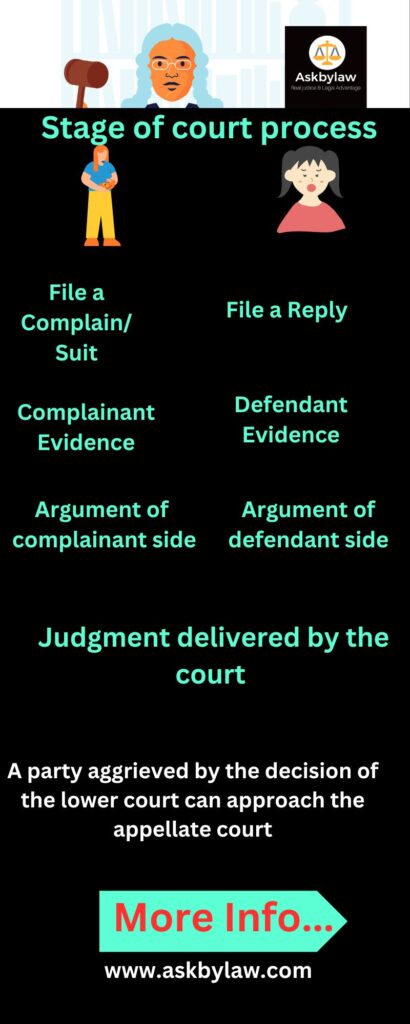

Blog article: Are decree absolute publish? | 7 ways of 100% legal review of words in the world.
Hi folks,
Are you listening to me! Really!
Aware you. What do you think? It is necessary for the common citizen of every country to know the meaning of some words and sentences of law? Look you. Without the law each citizen of every country is incomplete. And as well as without each and every citizen the law of every country is incomplete.
Basically, Law and human society intertwined. It may even be said that human society is ruled by law. Since the law governs human society. And, as much as each country has its own set of legal definitions in each country's parliament.
Afterward, One such legal term is "Court decree". In whose world it is spoken and discussed very vigorously. Today I am starting to discuss with you my knowledge and experience of the word "court decree" of law.
Whereas, What is a court decree? Why is that human being used in his life? What are its types? Having discussed all these in detail, I am sharing my knowledge and experience with you. We hope you enjoy reading this article and that it will be useful in raising your legal community.
Overall, A lot has been said and a lot has been written about the court decree. But I want to share with you a different fact through this article.
So let’s get started now without spending too much time.
Are you interested to reach: defining ownership and what is the definition of the beneficial owner
After that, In the United States (US) Civil Procedure code included-11 numbers of chapters. And, 86 numbers of rules are also included. For further study, I share its link here.
While the United States-59 new trial. The primary process of changing or amending a judgment.
(1) The ground for a new trial. Court, on the motion. On all or some of the issues - either party - may approve a new trial as follows.
(A) After a jury trial, for any reason for which a new trial has already been granted in federal court proceedings. Or
(B) After a non-jury trial, sometimes by a federal court, for any reason for which a rehearing has already been granted in a federal court equity claim.
Afterward, (2) Proceedings, mostly after a nonjury trial. After a non-essential trial. The court, in a motion for a new trial, may open judgments if one has been entered. In this case, May take additional testimony. May amend facts and law findings or make new judgment entries.
(b) Time to file a motion for a new trial. Proposals for a new trial must be submitted within 28 days of the entry of judgment.
(c) Time to give affidavit of the case. And when a proposal for a new trial is based on an affidavit. At that point, they must file with speed. Presently, The opposing party has 14 days to file an affidavit. In this situation, Federal courts may allow affidavits to answer.
(d) A new trial on the initiative of the Federal Court or on the ground that it is not in motion. Not later than 28 days after the entry of the federal judgments. After that Federal courts, in their own way, may order a new trial for any reason. In sum, Which party in America would justify the proposal? 2. In case After giving notice to the U.S. parties and giving them a chance to be heard, the court may make a timely proposal for a new trial for reasons not stated in the proposal. In fact, In any U.S. case, the court must clarify the reasons for its order till now.
(e) Speed of changing or amending federal judgment. As well as Proposals to change or amend the judgment must be filed 28 days after the judgment entry. court decree absolute in the USA
Are you interested to reach:? What is the Disadvantages of court marriage in India under the special marriage Act?
Consequently, The Code of Civil Procedure of the United Kingdom is divided into three main sections. And various provisions up to Section-40.20 have been included. For further study, I share its link here. court decree absolute in the Uk
despite, Wow. The United Kingdom's Civil Procedure Code provides provision for correction in the decree. As much as the court can granted correction without giving notice to the all parties.
Correspondingly, In the Chinese Civil Procedure, the code included 39 numbers of chapters. And 270 numbers of articles are also included. And, For further study, I share its link here. court decree absolute in the china
Equally, Nice. The Australian Civil Procedure Code believed to base on the principles of the Common Law. As well as, we need to know in detail the power of the court to amendment in the decree. Learn more…
In case, Dionys v. Misa Nona Court of Appeal, Ceylon. Lesles CJ and Middleton J., 15 November 1911 Court of Appeal Case of Ceylon, No. 7931 DC Galle. Judges: Lascelles CJ and Middleton J. Read more…
Further, the Amendment after passing the seal of the Australian Court. Second-189 Civil Procedure Code. Internal jurisdiction of the Australian Supreme Court.
The decree cannot be amended unless provided for by Article 189 of the Australian Civil Procedure Code. As well as Except for the provisions of the Civil Procedure Code, the Supreme Court has the power to amend its ordinance to suit its purpose as set forth in the judgment. But it has no authority to supply an inadvertent error after the decree has been sealed.
Additionally, That The Australian court's action was one of kind. As much as, the present petitioner intervened by claiming a portion of the land demanded for partition and prayed for its exclusion from partition. And his claim was rejected with costs. On his appeal, the apex court, in 1911, allowed the appellant's claim with the costs of the appeal and reversed the judgment of the district judge.
In case, no order was made in the lower court regarding the cost of the dispute. An order was then prepared in accordance with the judgment, and the seal of the Supreme Court was affixed. As well as the record was returned to the district court.
In truth, The Australian appellant made the current application to the district court to amend the Supreme Court's order by ordering the defendant to pay the costs of the dispute. In this situation, The Australian court has the innate power to make the requisite amendments. That the Australian court's ruling, which now stands, is absurd, but the appellant will have to pay the price for the controversy in which it has succeeded.
The question is whether the court is able to amend its decree on grounds other than those stated in section 189.
This seems to be the improvement that is being sought now. But that order is wider in its scope than Article-189 of the Code of Civil Procedure. As much as it provides for errors arising from accidental slip or miss. Moreover, it is not limited to amending the judgment and the changes between the decree and the clerk. Arithmetic errors.
Certainly, This Australian court has the power to amend its decree, except for the provisions of the Civil Procedure Code. So that the judge may be brought to his senses as indicated in the judgment, and can hardly be suspected. But that is another matter. After passing the decree seal, supply the error made inadvertently.
Equally, In India, it has been held under the corresponding constitution. As well as the provisions of Article-206K of the Code of Civil Procedure should not be amended by an Australian court. And in England, it is believed that the court cannot correct its own error once the judgment has been completed, even though the error is obvious in the face of the judgment.
Similarly, This is against the authority of the Australian Court and in the absence of any provision in the Court Ordinance which may indicate that the Supreme Court has the natural power to make such an amendment. Australian court judges noted that with some reluctance, we are bound to say that we are, at this stage, unable to engage in motion. Rates are fired with costs.
Are you interested to reach: Why arbitration clause in the Partnership deed?
Consequently, The Code of Civil Procedure of India is divided into three main 159 sections. And various provisions up to Order-49 have been included. For further study I share its link here.
Equally, Wow. The United Kingdom's Civil Procedure Code provides provision for correction in the decree. As much as the court can granted correction without giving notice to the all parties.
Basically, Wow. India's Civil Procedure Code-1908 provides provision under section-151 for correction in the decree.
|
Decree |
Judgment |
| The decree in the CPC is the thing that declares the outcome of the claim. And specifically determines the rights and responsibilities of the parties to the case. | Judgment according to the CPC is a statement given by a judge. And who decides on all issues relating to the lawsuit. And clarifies the disputing rights and responsibilities of the parties. |
| Pursuant to Section-2(2) of the Code of Civil Procedure-1908. | Pursuant to Section-2(9) of the Code of Civil Procedure-1908. |
| Operating part under CPC | Final part under CPC |
| Civil and or criminal nature | Only for civil nature dispute |
| Last of decision | First of decision |
| The decree is capable for executions | Judgment is not capable for executions |
| decree | Order |
| Decree entertained under section-2(2) of CPC | Order entertained under section-2(14) of CPC |
| Decrees mean the former expression of adjudication. So far as regards the court expression it, conclusively determines the rights of the parties with regard to all any of the matters in controversy in the suit and may either preliminary or final | As per section-2(14) of the cpc under means the formal expression of any decision(order) of a civil court which is not a decree |
| Decree only passed in a suit. Which commenced by presentation of plaint | An order may originate from a suit by presentation a plaint or may arise from proceedings. |
| Decree may be preliminary of final or partly preliminary and partly final | An order cannot be as a preliminary order. |
| Every decree is applicable | Every order is not applicable |

|
Compromise decree |
Consent decree |
|
| Compromise decree entertained under order-XXIII Rule-3 of CPC | Consent decree entertained under order-XII Rule-6A of CPC |
under section |
| Compromise decree is not decision of the court | The consent decree is decision of the court |
Decision of court |
| The compromise decree is appealable under the merits of the case | Compromise decree is appealable but sometime not challenged under the merits of case |
Appealable |
| The Compromise decree cannot affect from res judicata | Consent decree can affect from res judicata |
Res judicata |
| A compromise decree can initiate from estoppels | Consent decree can initiate from estoppels |
Estoppel |
| Non-execution for compromise decree arises reason a contempt of court | Non-execution for consent decree arises reason a contempt of court |
Execution |
| Separate suit can be filed before and of limitation of compromised decree. | Separate suit cannot be filed before and after of limitation of compromised decree. |
Re-claim |
Additionally, an Ex-parte decree in a civil suit is a decree passed against a defendant in his absence. Although they have received summons service, only the plaintiff appears on the scheduled date of hearing and the defendant does not appear. In such a case the court may hear the suit on one side and pass a decree against the defendant.
(A) According to Rule-1 of the Order VIII Civil Procedure Code, the respondent is required to submit a written statement within 30 days from the date of service of the summons. In exceptional circumstances, the summons may not be issued more than 90 days from the date of service. [B] According to the Code of Civil Procedure, if the defendant fails to appear within such period, the court may rule on the matter on the basis of facts. (C) The decree passed under Rule-10 of Order VIII of the Code of Civil Procedure is, however, a pre-run decree for the default of the respondent in filing a written statement. This is subject to Rule-13 of Order-IX. (D) There is no failure of natural justice in the Code of Civil Procedure if, as a result, a pre-party order is passed by a competent court despite giving proper notice to the party.
"Setting aside a decree against any defendant - in any case in which a decree has been passed against the defendant, he can apply to the court. That the decree was passed by the court for an order to keep it separate, and if it satisfies the court that the summons was not executed properly. And or was sufficient for his failure to appear when the suit was called for hearing, and the court may, against such conditions as the payment of costs to the court against him or otherwise (sic) deem it appropriate, and appoint a day to proceed with the suit. "
The petitioner has to satisfy the court that he had sufficient reason for his absence on the date of the hearing and when the evidence was called for hearing. But an application under this rule cannot be accepted on moral or humanitarian grounds. The courts of justice cannot be deaf to the realities of life.
The CPC further states that "no court has set aside an order passed merely on the ground that there was any irregularity in the service of summons." And if he is satisfied that the defendant was notified of the date of the hearing and had sufficient time to appear. And respond to the plaintiff's claim.
A party to a dispute cannot be set aside if the party against whom the decree has been passed, and if he is aware of the date of the hearing. And even if an irregularity is established in the service of summons, the court cannot set aside a one-sided order if the respondent has been given notice of the date of hearing. R.S. Bhatnagar Vs. In Bakt Sajjan, the court noted the difference between irregularity and illegality in the service of summons. And the illegality in the service of summons is when the process violates certain statutory provisions which make it void. And when the irregularity is a defect in following its prescribed procedure and cannot be reversed.
Court rules Pratik Sharma v. In Vimal Chand Agarwal, the court held that despite any irregularity in the service of summons, intentional inaction of the petitioner despite being aware of the proceedings, his claim of setting aside the former party order could not be justified.
The plaintiff must be given sufficient time to appear in the suit and respond to the plaintiff's claim. However, their knowledge of the date of hearing from the knowledge of the pendency of a civil claim does not constitute an estimate.
Connector "and" in the civil provision indicate that both the parties i.e. the date of the hearing and the reasonable time to appear before the court should be present. And the purpose of the provision is to prevent the delaying tactics of the defendants. The nature of this provision is on the exception of the general rule.
The burden of proof in the suit rests with the petitioner who prays to set aside the former party's order to establish that the summons in the suit were not properly served on him. Or it was just a reason not to attend. In the case of Proviso-2, the exception is a burden on the beneficiary.
The court held that G.P. Srivastava v. R.K. In Raizada [37], the Supreme Court ruled that the reason for his absence was sufficient to refer to the date on which the former party order was passed due to his absence. This cannot be extended to rely on further circumstances. Defendant cannot be penalized for previous negligence which was ignored and later pardoned. In the absence of any impure intent and remedy which is not restricted by the limit, the courts should favor the defendant unless there are sufficient grounds against it. The civil court was of the opinion that the provision to set aside the decree should be given a comprehensive construction and no strict and expeditious guidelines could be laid down.
India's Sushil Kumar Sabharwal v. In Gurpit Singh, the apex court ruled that not serving the summons was a reason to set aside the former party order. And the service of summons to the party cannot be a mere formality. In fact, there should be. Naresh Chandra Agarwal Vs. The appellant's application to set aside the former party's order in Bank of Baroda was rejected by the trial court and later by the high court. This is because he accepted the validity of the substitution notice sent to the permanent residence address instead of his actual current residence. In the suit, the plaintiff admitted in his affidavit that the applicant was working elsewhere at the relevant time. The apex court on the appellate court set aside the order as it held that the summons was not in fact granted.
Court Ravindra Singh v. Defendants in Financial Com who have been living abroad for the last 25 years and despite knowing the plaintiff's true address, have never received any notice. The village address was affected by the summons. In it, the court held that the pre-party order passed in the case of non-appearance of the respondent without giving the respondent an opportunity of hearing causes prejudice for the respondent. And that is contrary to the principles of natural justice.
The court should be satisfied before using its discretion that the summons were not executed properly when the court seeks remedy against the pre-party order.
In civil suit, if the applicant refuses to accept the notice and requests to set aside the ex-part decree on the basis of the absence of notice, it cannot be considered. If the respondent did not accept the summons on the basis of misrepresentation, however, the service is deemed to be good, as a result of which the ex-party decree passed may be set aside.
In any case, a regular suit can be filed against an ex-party order obtained through alleged fraud. In order to maintain such proceedings, it must be proved that the alleged fraud must be a real, positive fraud, contemplation and intentional conspiracy. So that the parties to the suit and the court may be kept in the dark so that an order may be obtained by conspiracy. A claim can be upheld despite a failed application or rejection of an appeal under CPC Order-IX and Rule-13.
The mere non-service of the summons in the case is not a reason to set aside the former party’s order on the grounds of fraud. But there is fraudulent repression of summons. [Court rules AC Anantaswamy v. Boria was heavily accused of fraud. Also, no charges of fraud were made in the two previous proceedings before this appeal. The question before the civil court was whether not serving the summons was tantamount to fraud. In it, the court held that it is not appropriate to maintain a one-sided injunction on non-service of summons only.
However, the court rejected the petition of the respondent to set aside the order under Rule-13 and Order-IX. Subsequent regular suit to set aside the same fraud on the basis of fraud in case of non-serving of summons on it is prohibited due to application of section-11 regarding Res Judicata under CPC.
In order to establish an allegation of fraud against a party, it is necessary to show that the submission made was incorrect in the knowledge of the party making such submission or the party lacked reasonable grounds to believe that it was false. And the standard of evidence is extremely high.
False-hood of a claim as a basis for non-service or fraud of a court summons may not be sufficient to support a claim alone; once a summons has not been served, it will be established that a false civil suit will be an element from which the fraud can be deduced. The decree can be passed by setting aside the pre-party decree when these two elements co-exist.
Are you interested to reach: Can someone sue you after insurance pays} 5ways to obtain 100% claim

In like manner, Did you find this article useful? In this article, I have made a humble attempt to explain to you in detail about the meaning of court order, status in law, effect of the court order and its use. Each party should read the court order carefully. And if there is any confusion, you should go to your lawyer and get it resolved. You may be in trouble for violating certain rights and obligations determined by the court by court order. That is why it is necessary and mandatory for every decree-holder to get the information of his party. If a party to your medicine has breached your duty, report it to your lawyer immediately and take action if a breach of law is required in court.
To that end, Decree absolute. What nice tips. This article also discusses in detail what should be done after receiving a court order. If you follow the instructions given in this article, I am sure you will not face any major problem after getting the court order. However, if you have any confusion you can contact me to resolve it. We will work with you to resolve your confusion over the court order.
Jai Hind Jai Bharat




Founder And Main Partner of Askbylaw Associates






As per the foundations of the Bar Council of Bharat (India), Advocate Viren.S.Dave isn't permissible to solicit work and advertise. By clicking the “Agree” button and accessing this web site (www.asklbylaw.com) the user absolutely accepts that you just Maineasure seeking info of your own accord and volition which no kind of solicitation has taken place by me.The info provided below this web site is exclusively accessible at your request for information functions solely. It mustn't be understood as soliciting or advert. Advocate Viren.S.Dave isn't accountable for any consequence of any action taken by the user hoping on material / info provided below this web site. In cases wherever the user has any legal problems, he/she altogether cases should obtain freelance legal recommendation.